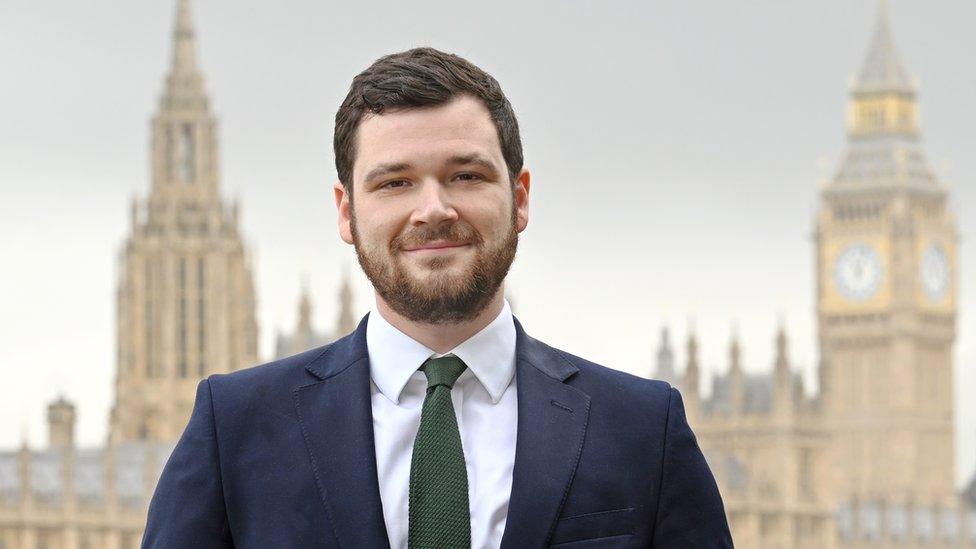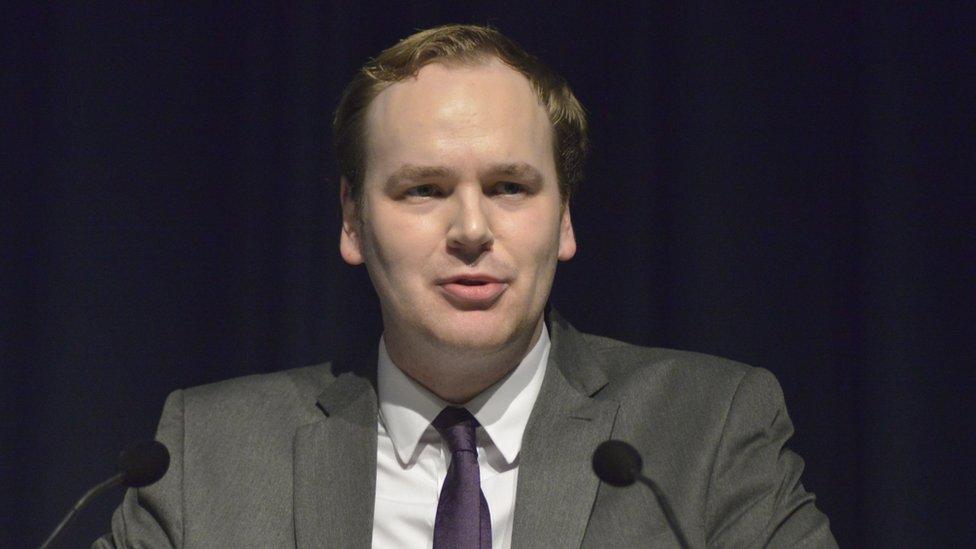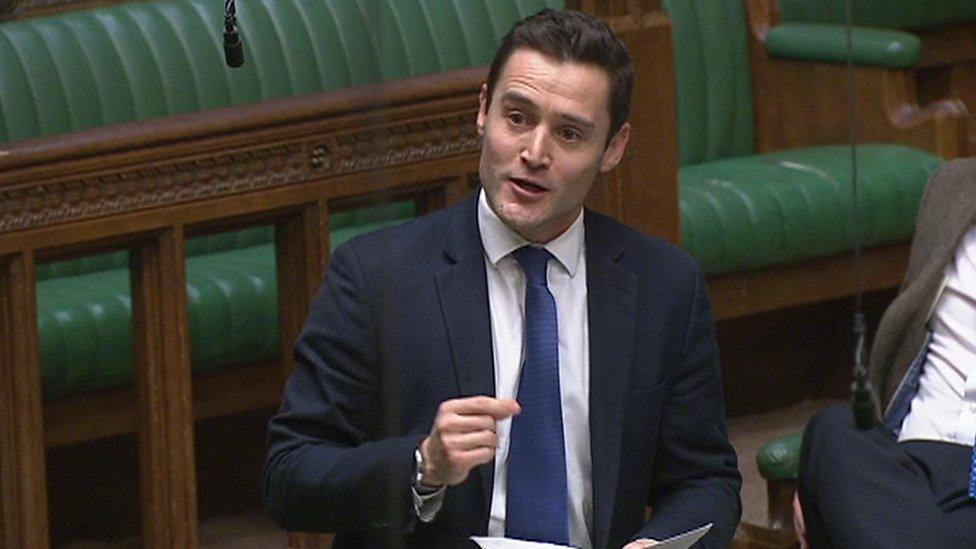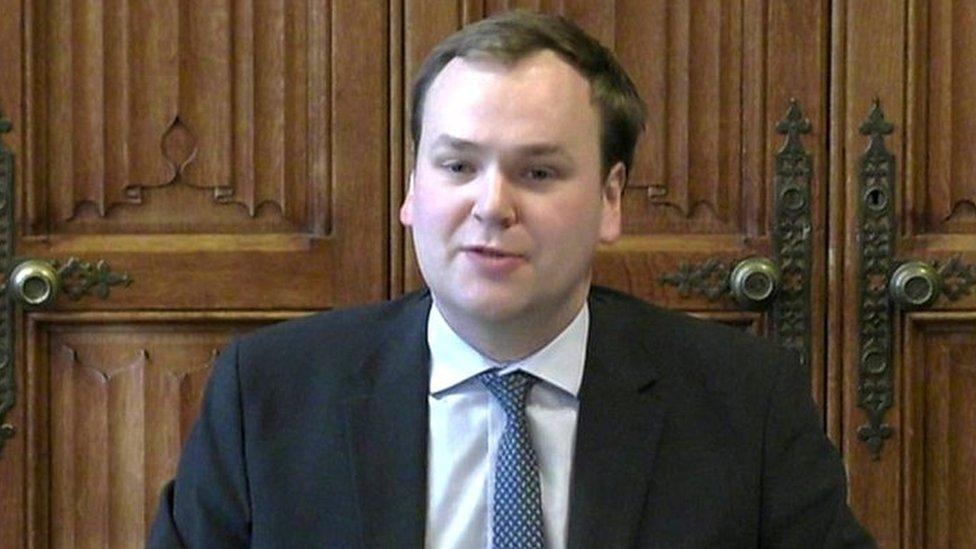How I was targeted in the Westminster honeytrap
- Published

In political journalism you deal with lots of different kinds of stories - stories about policies, stories about ministerial rivalries, stories about geopolitics, stories about local politics.
Then some stories are just plain weird, like the one that broke last week about the honeytrap targeting men in Westminster. There are still lots of unanswered questions about the case, which I hope to dig into in my job as the BBC's chief political correspondent.
For that reason, I should also be upfront that I was among the men targeted.
It started with a WhatsApp on a Sunday morning in March. Coming from a number I did not have saved in my phone, it read: "Henry! Long time no speak - how're you doing? Miss seeing you around Westminster x."
The user's profile picture showed a man and a woman, both probably in their 20s, having dinner. I zoomed in on the photo as much as I could but recognised neither of them.
"V sorry," I replied. "Who is this?"
The response was instant. "Haha it's Charlie! I used to work in Parliament and we swapped numbers after drinking one night."
And then seconds later: "I'd pretend to be offended but it was a while ago x."
This was pretty odd now. Yes, one way a journalist might make contacts in Westminster is to hang around the bars and pubs. But the point is to make contacts, not to fail to save their number and then forget them. And more obviously - why did Charlie keep leaving kisses at the end of their messages?
I put my phone down and decided to leave it but my non-response left Charlie dissatisfied. A few minutes later they came back: "Random Sunday message I know."
After waiting a further six minutes for more from me, Charlie's apparent intentions became more clear. "I'm going to guess you aren't still single - should I bow out gracefully? Lucky girl x."
From pretty odd to very odd indeed. No thanks. I blocked Charlie, meaning they could not send me more messages. But the question of what exactly the brief exchange was all about nagged at me for the rest of the day.
I flitted between thinking that a hostile state may have been attempting to entrap me - though it's hard not to have that thought without feeling instantly absurd and pompous - and rustling through my mental Filofax to make absolutely sure that I hadn't ever met this Charlie and given them the wrong end of the stick.
What I now know, thanks to reporting by Politico, external, is that I was just one of at least a dozen men in political circles who received unsolicited WhatsApp messages along those lines. Some, including MPs, reportedly fared much worse than me. Rather than blocking the sender, they kept the conversation going long enough to be sent explicit images. Reportedly at least one person reciprocated.
William Wragg, a Conservative MP who I happen to have got to know fairly well as a professional contact over the years, came forward to admit that he had been caught up in the affair, saying he passed the personal phone numbers of colleagues to a man he met on a dating app who had "compromising things" on him.
Harry Yorke, a journalist at the Sunday Times, has also said, external that he received flirtatious messages from Charlie. Others, anonymously, have said they received messages instead from a woman calling herself Abi, operating from a different phone number.
Unlike any other cases I'm aware of, I was contacted by both. Because my brief Sunday morning exchange with Charlie was not the end of things.
Almost exactly 24 hours after Charlie's first message, another WhatsApp from an unknown number arrived in my inbox. This time the photo was a woman in front of a ruined abbey, her face artfully turned away from the camera.
"Are you in Westminster today? Monday drink? X."
Instantly I was sure this was the same person as the day before. Charlie clearly was not an innocuous encounter I had forgotten, but one which never took place.
"Who is this?" I replied.
"Abi Miller x."
They claimed to have previously been an intern at The Times, where I worked until last year.
"Always used to joke that you were the only fit one in the politics team."
Never mind the unfair slight on my former colleagues - this was now getting quite sinister. I blocked the number, but by this point was feeling much more rattled than the day before.
Was this to be a daily occurrence? I was confident I was being scammed in some way but the idiomatic language and contextual knowledge of Westminster was unsettling.

William Wragg apologised after passing on the numbers of fellow MPs to a man he met on a dating app
Flustered, I realised I didn't even know what blocking somebody on WhatsApp meant. Did they know they had been blocked? Were they sending messages into a void? After 40 minutes of chewing it over in my head, I decided to unblock Abi to see if WhatsApp showed me any messages she had sent in the meantime.
That was probably a mistake. I didn't get any messages Abi might have sent when blocked, but the act of unblocking did show Abi that I was online. She pounced instantly: "Did you block and unblock me?"
"What do you want?" I replied.
"I messaged to see if you fancied a drink."
"Yeah but you are clearly the same person as yesterday," I said.
At this point Abi appeared to admit that she was indeed Charlie. "I was sad you blocked me," she said.
I twice asked Abi "who are you?", getting no clear response, before she replied: "What are you expecting me to say? I was horny and I messaged you. That's kind of it."
For want of a better phrase, I was now really creeped out. I blocked Abi again. But I was surprised by how violating it felt to have someone being so strange to me over my phone. A phone is just a piece of hardware but it's where we now live so much of our professional and personal lives.
I spent the evening and the next morning wondering whether a third number would try to contact me. As the 24-hour mark passed I relaxed. I recounted the experience to my line manager and stopped thinking about it.
In some ways, it was a relief to learn that I was just one of many contacted by Charlie or Abi. It felt less personal, though clearly a bit of thought had gone into the exercise, drawing upon my career history for example.
But many questions remain unanswered. Who on earth was behind it? What did they want? Was the motive blackmail or extortion? Or did they actually seek gratification from the exchanges and any photos they managed to procure?
Why me? Was my number passed on by Mr Wragg or obtained in another way altogether?
If it is true that some MPs did fall for the exercise, are they now compromised?
And how many other attempts, clumsy or sophisticated, have succeeded in the past that we never found out about?
- Published5 April 2024

- Published5 April 2024

- Published5 April 2024
